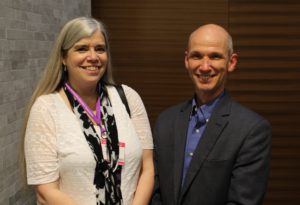I Am Starr King: Interview with The Revs. Elaine & Axel Gehrmann
 Graduates of Starr King (Class of ’89 and ’88)
Graduates of Starr King (Class of ’89 and ’88)
Co-ministers at the UU Church of the Monterey Peninsula
Why did you decide to become a religious leader?
Elaine: I was raised a Unitarian Universalist in the First Unitarian Church of Pittsburgh. I wasn’t sure I wanted to be a religious leader, but I wanted to go to school to explore the possibility. It was the experience and the education I had at Starr King that made know I wanted to become a religious leader.
Axel: I was also raised Unitarian Universalist. As it happens, my father was also a graduate of Starr King School for the Ministry and I have an older brother who graduated from Starr King as well. So I come from a family of liberal religionists. When I was in my teens considering what to do after high school, that was a disincentive for me, because at that stage of my life I felt a need to distance myself from my family. But after much soul searching I decided that going to seminary might be a good opportunity to pursue some questions that were on my mind – grappling with the meaning of life and the point of it all.
And so I started based on a hunch. I lived in Germany at the time. I was in the process of preparing a statement as to why I wanted to be a conscientious objector rather than enter German military service. I reflected on my personal formation and I realized that some of the religious messages I had internalized in the course of my life were more important to me than I had realized. That was the impetus to give seminary a try. If there is a trajectory to my life, it is that with every passing year ministry has felt more firmly like the right thing to do.
Why did you decide to study at Starr King?
Elaine: I didn’t know anything about UU seminaries when I thought I wanted to explore the possibility of becoming a minister. I was living in Pittsburgh and I looked in the back of the UUA directory and the three seminaries they listed were Harvard in Boston, Meadville in Chicago, and Starr King in Berkeley, and I thought “I’m going to Berkeley.” Then I found out more about Starr King and could see that their approach to ministerial education seemed unique and different from the other schools.
Axel: My theological education began in Germany, in Frankfurt. I completed two years of Protestant study there, which was time well spent. But it became abundantly clear that I really needed a religious education that was more aligned with my liberal religious values and so Starr King was the likely candidate. I was especially drawn to Starr King’s student-centered approach.
What is your most meaningful or memorable experience at Starr King?
Elaine: I would say my “don rags” with the core faculty members. Once each semester we had a conversation with the core faculty that focused on what I felt I needed to learn and where I needed to go. They don’t do those anymore but those conversations with faculty, even aside from the don rags, really stick out in my mind. I really felt that the faculty took me and my doubts and my questions very seriously. They were great soundingboards and had some very wise things to say.
Axel: I guess one memory that comes to mind is the Theology Tutorials with Bob Kimball (former SKSM President), which were one-on-one free-flowing conversations. He looked at our lives and our experiences and our thoughts, and framed them in a theological context. He found ways to introduce reading materials that were exactly tailored to the questions that were on my mind. It was very worthwhile.
And the other memorable experience was the preaching class that Ron Cook led. The class moved very much with the comments of the students and the feedback they offered. Ron was often the last one to offer feedback and his classic question was “So what?” After a student had spilled their soul, laid it all out, sometimes tearfully, Ron would ask “So what? What is the point? Why does it matter?” And that is a certainly a question that remains with me in many aspects of my ministry. And surely that is a great litmus test for us in whatever we do.
Why is it important to have a place like Starr King in the world?
Axel: If Unitarian Universalism is indeed an individualistic religion, insofar as it encourages people to trust their own authority in matters of religion and find ways to express what they believe and what is sacred to them, if that indeed is a central part of Unitarian Universalism, Starr King’s pedagogical approach is uniquely suited to that because it’s all about people recognizing, developing, and embracing their own authority responsibly.
Elaine: I always appreciated Starr King’s student-centered approach. I was very young when I went to Starr King and in many ways I felt that I didn’t know a lot. But Starr King felt that I did know something. And I did. It really helped to have a place that both affirmed what I already knew about life – my own life experiences, my beliefs and values – and also a place that really helped me figure out what else I needed to know and to learn. I’ve sat in a lot of classes during my lifetime, but Starr King is really the place that I feel I received the greatest education.
Want to share your story? Send your story to communications@sksm.edu.